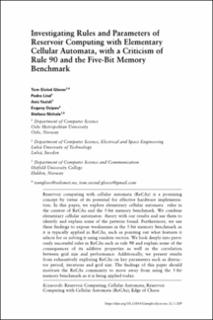Investigating Rules and Parameters of Reservoir Computing with Elementary Cellular Automata, with a Criticism of Rule 90 and the Five-Bit Memory Benchmark
Journal article, Peer reviewed
Published version

Åpne
Permanent lenke
https://hdl.handle.net/11250/3115846Utgivelsesdato
2023Metadata
Vis full innførselSamlinger
Originalversjon
Complex Systems. 2023, 32 (3), 309-351. https://doi.org/10.25088/ComplexSystems.32.3.309Sammendrag
Reservoir computing with cellular automata (ReCAs) is a promising concept by virtue of its potential for effective hardware implementation. In this paper, we explore elementary cellular automata rules in the context of ReCAs and the 5-bit memory benchmark. We combine elementary cellular automaton theory with our results and use them to identify and explain some of the patterns found. Furthermore, we use these findings to expose weaknesses in the 5-bit memory benchmark as it is typically applied in ReCAs, such as pointing out what features it selects for or solving it using random vectors. We look deeply into previously successful rules in ReCAs such as rule 90 and explain some of the consequences of its additive properties as well as the correlation between grid size and performance. Additionally, we present results from exhaustively exploring ReCAs on key parameters such as distractor period, iterations and grid size. The findings of this paper should motivate the ReCAs community to move away from using the 5-bit memory benchmark as it is being applied today.
